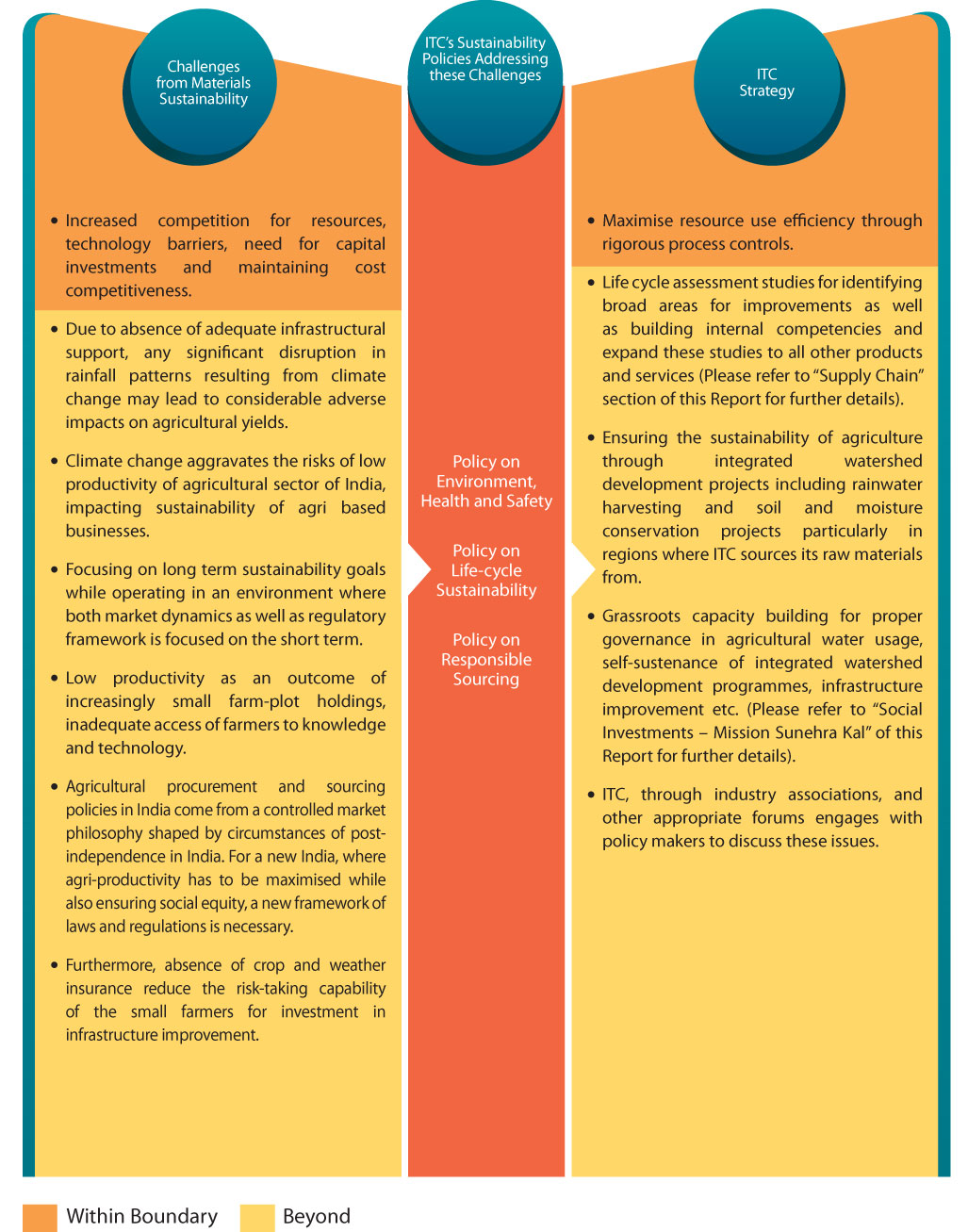-
Category: Environment
All ITC Units continue to pursue efficient use of natural resources through extensive process management initiatives focused on waste elimination/reduction. Moreover, as most of ITC's businesses are vertically integrated, this provides the company unique opportunities for exercising greater control over waste minimisation. Such integration facilitates optimum utilisation of raw materials, recycling/ reuse of wastes as well as efficient logistics.
For addressing the impacts outside the boundary of operations, life cycle assessment study of ITC's products are progressively being taken up with the objective of making such studies an integral part of product design and development. In addition, Board approved policies of ITC supplemented by a 'Code of Conduct for Vendors and Service providers' provide the direction for sustainable sourcing of raw materials to ensure their long-term availability. Please refer to "Supply Chain" section of this Report for further details.

ITC's products and services can be broadly classified into the following categories:
Cigarettes, Branded Packaged Foods, Personal Care Products, Education and Stationery products, Matches and Agarbatti.
Paper, Paperboards, Packaging, Leaf Tobacco, etc.
Hoteliering and Information Technology.
A very significant proportion of raw materials in ITC businesses are sourced from agricultural farms and plantations. In 2014-15, ITC processed over 27,50,000 tonnes of materials, out of which 97% were from agricultural farms and plantations which are renewable. 58% of this renewable raw materials was sourced by Paperboards and Specialty Papers business (ITC's initiatives in promoting sustainable social and farm forestry plantations have been detailed in "Social Investments: Mission Sunehra Kal" section). Another 34% of the renewable raw materials was procured by the Foods and Agri Businesses. Sustainability aspects in the supply chain of these businesses have been detailed in the "Supply Chain" and "Product Responsibility" sections of this Report. Green leaf tobacco which constitutes around 8% of the total renewable raw materials is procured by the Leaf Tobacco Division of ITC from tobacco auction platforms. This Division also works on the social and environmental performance of its leaf tobacco supply chain through the Social Responsibility in Tobacco Production (SRTP) programme, performance of which is monitored by AB Sustain, an independent third party reviewer. The uniqueness of this programme is that it covers all aspects of the tobacco leaf value chain which ensures best practices in tobacco farming and processing.
Wood is a major source of fibre for the paper and paperboards industry. Availability of wood remains a critical challenge and is a serious sustainability concern, especially in a country with limited natural resources and acute income inequities.
Approximately 48% of the total fibre requirements of ITC's Paperboards and Specialty Papers Division is met by the pulp manufactured at Bhadrachalam, another 22% comes from recycled fibre, processed at Kovai and Bhadrachalam, and the balance 30% is imported pulp used at Bhadrachalam and Tribeni Units. Approximately 74% of fibre manufactured in Bhadrachalam is from wood sourced from ITC's social and farm forestry initiatives. Majority of fibre used for operations at the Kovai Unit is from recycled fibre and ITC confirms that 100% of wood and recycled fibre used by ITC's Paperboards and Specialty Papers Business is of known and legal origin. In-house R&D has developed high yielding, site specific, disease resistant eucalyptus and subabul clones on the back of extensive knowledge of plantation management practices. ITC distributed 167.18 million high quality saplings to farmers which resulted in increasing the area under social and farm forestry by 29,933 hectares in 2014-15.
Apart from the obvious benefits of increasing the green cover, plantation on degradable wastelands under the social forestry programme, also directly contributes to in-situ moisture conservation, ground water recharge and significant reduction in topsoil losses caused by wind and water erosion. In addition, as a result of the leaf litter from multi-species plantations and the promotion of leguminous intercrops, soils are constantly enriched.
Further consolidating ITC's Triple Bottom Line performance, the four units of ITC's Paperboards and Specialty Papers Division i.e Bhadrachalam, Bollaram, Kovai and Tribeni, received the prestigious 'Forest Stewardship Council (FSC) Chain of Custody' Certification in 2009 and have retained the same during the current year also. To ensure responsible wood all domestic wood procurement sources have been certified as per standards of FSC-Controlled Wood.
The FSC is an independent, non-governmental, not-for-profit organisation established to promote the responsible management of the world's forests and is recognised as the gold standard in wood certification for ethical and legal sourcing. The FSC is represented in more than 107 countries around the world, and is the most widely accepted and respected amongst forest product certification schemes.
FSC endorsement implies that an organisation complies with its principles and criteria in the different areas of its functioning. ITC's Paper and Paperboard Division can supply FSC certified paper /paperboards from all its four manufacturing Units under the categories of 'FSC Mixed' or 'FSC Recycled'. FSC logo on products assures customers that the products/packaging is from legal, sustainable and well managed sources.
The FSC certification for ITC's Paperboards and Specialty Papers Units exemplifies the organisation's continued commitment to sustainable business practices and to the building of an inclusive and secure future for both its stakeholders and society at large.
In the coming years, ITC plans to carry out more life cycle assessment studies of products/ services to evaluate the environmental impact at various life cycle stages, which would help in identifying opportunities for further improving their environmental attributes. In line with the Board approved Policies on Life Cycle Sustainability and Responsible Sourcing, formal systems and procedures will be progressively implemented across ITC Businesses.


